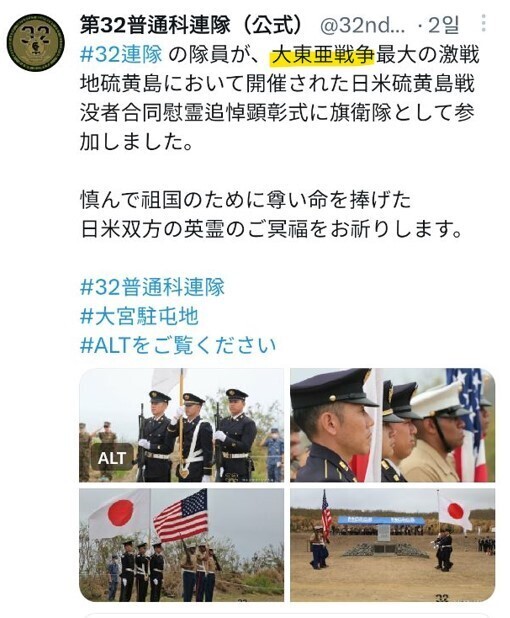hankyoreh
Links to other country sites 다른 나라 사이트 링크
Japanese military unit’s use of whitewashing term for Pacific War causes a stir

A unit in the Japan Ground Self-Defense Force (JGSDF) used the euphemistic term “Greater East Asia War” on its official social media account, the Hankyoreh confirmed on Monday. The term is taboo in Japan and elsewhere because it whitewashes Japan’s wars of aggression by implying that they were designed to liberate Western colonies in Asia.
The JGSDF 32nd Infantry Regiment wrote on an official social media account on Friday that “soldiers from the unit took part in a joint memorial service on Iwo Jima for American and Japanese service members who died in one of the hardest-fought battles of the Greater East Asia War.”
“We honor soldiers from both Japan and the US who gave their precious lives for their countries,” the regiment added.
The use of the term “Greater East Asia War” on the official social media account of a unit from the Japan Self-Defense Forces has stirred up criticism online, with some commenters arguing that the term “seeks to justify [Japan’s] colonial rule and aggression in China, Korea, Taiwan and Southeast Asia” and that it “shouldn’t be used by state organizations.”
Japanese newspaper the Asahi Shimbun stressed that “the Japanese government doesn’t use this term in official documents.” The JGSDF told the Asahi Shimbun that it “cannot comment today” on the use of the term.
The term “Greater East Asia War” was officially adopted in a 1941 meeting of the Japanese cabinet under Prime Minister Hideki Tojo, who was later convicted as a Class A war criminal for his role in World War II.
The term figured in Japanese propaganda about setting up a “Greater East Asia Co-Prosperity Sphere” by liberating the Asian colonies of European empires and enabling Asia to stand on its own. When the US military occupied Japan after its defeat in the war, the military government banned the term’s use in official documents.
The taboo basically remains in place today, with the Japanese government still avoiding the term. Japanese usually talk about the “Pacific War” and “World War II.” “Greater East Asia War” is generally only used by such far-right groups as the Japanese Society for History Textbook Reform, which is infamous for its distortions of history.
The JGSDF also courted controversy at the beginning of this year when a group of several dozen senior officers, including generals, reportedly paid their respects at the Yasukuni Shrine, which honors Class A war criminals from World War II.
By Kim So-youn, Tokyo correspondent
Please direct questions or comments to [english@hani.co.kr]

Editorial・opinion
![[Guest essay] Maybe Korea’s rapid population decline is an opportunity, not a crisis [Guest essay] Maybe Korea’s rapid population decline is an opportunity, not a crisis](https://flexible.img.hani.co.kr/flexible/normal/500/300/imgdb/original/2024/0430/9417144634983596.jpg) [Guest essay] Maybe Korea’s rapid population decline is an opportunity, not a crisis
[Guest essay] Maybe Korea’s rapid population decline is an opportunity, not a crisis![[Column] Can Yoon steer diplomacy with Russia, China back on track? [Column] Can Yoon steer diplomacy with Russia, China back on track?](https://flexible.img.hani.co.kr/flexible/normal/500/300/imgdb/original/2024/0430/1617144616798244.jpg) [Column] Can Yoon steer diplomacy with Russia, China back on track?
[Column] Can Yoon steer diplomacy with Russia, China back on track?- [Column] Season 2 of special prosecutor probe may be coming to Korea soon
- [Column] Park Geun-hye déjà vu in Yoon Suk-yeol
- [Editorial] New weight of N. Korea’s nuclear threats makes dialogue all the more urgent
- [Guest essay] The real reason Korea’s new right wants to dub Rhee a founding father
- [Column] ‘Choson’: Is it time we start referring to N. Korea in its own terms?
- [Editorial] Japan’s rewriting of history with Korea has gone too far
- [Column] The president’s questionable capacity for dialogue
- [Column] Are chaebol firms just pizza pies for families to divvy up as they please?
Most viewed articles
- 1Under conservative chief, Korea’s TRC brands teenage wartime massacre victims as traitors
- 2[Guest essay] Maybe Korea’s rapid population decline is an opportunity, not a crisis
- 3Value of Korean won down 7.3% in 2024, a steeper plunge than during 2008 crisis
- 4Two factors that’ll decide if Korea’s economy keeps on its upward trend
- 5[Column] Can Yoon steer diplomacy with Russia, China back on track?
- 6Dermatology, plastic surgery drove record medical tourism to Korea in 2023
- 7After election rout, Yoon’s left with 3 choices for dealing with the opposition
- 8Why Kim Jong-un is scrapping the term ‘Day of the Sun’ and toning down fanfare for predecessors
- 9Strong dollar isn’t all that’s pushing won exchange rate into to 1,400 range
- 10‘We must say no’: Seoul defense chief on Korean, USFK involvement in hypothetical Taiwan crisis